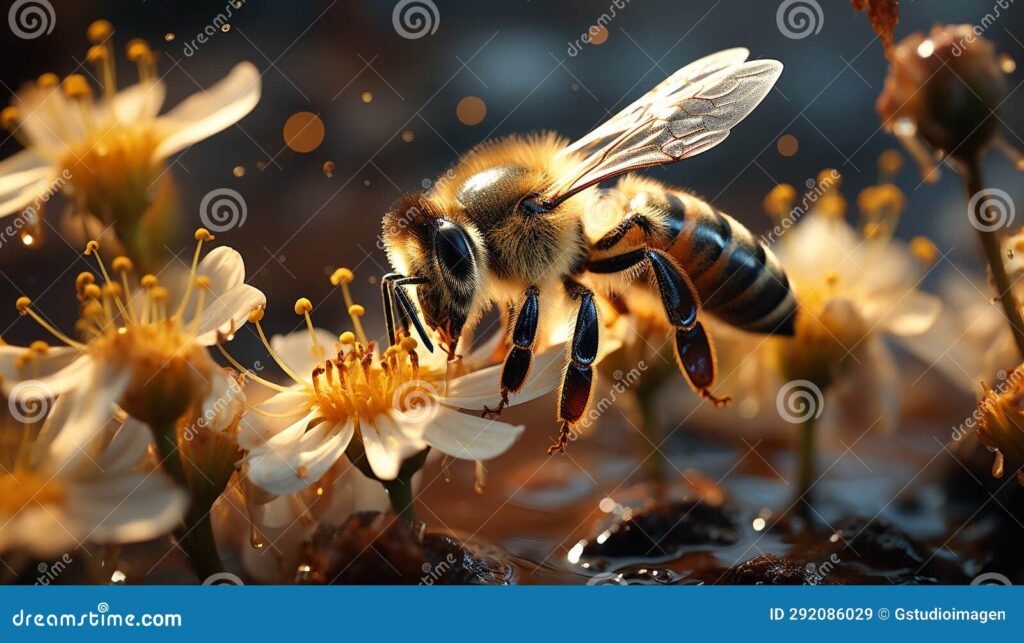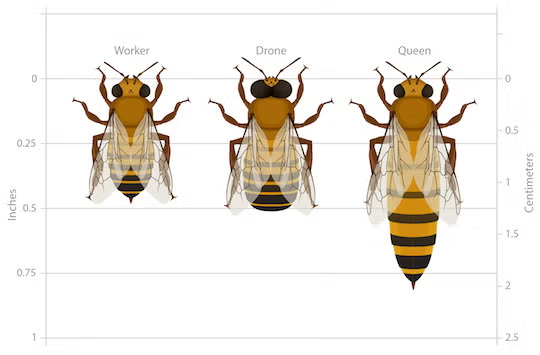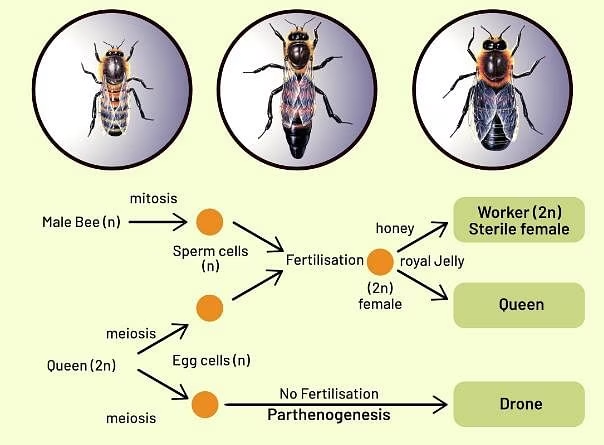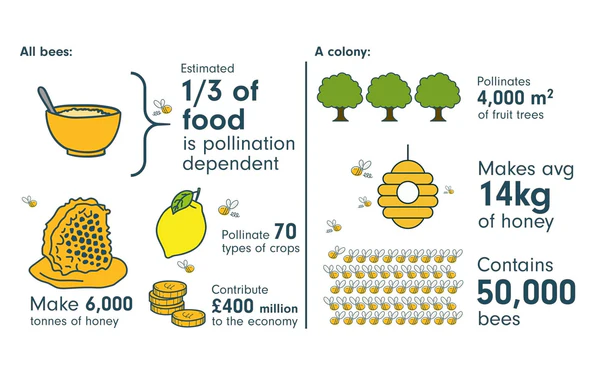Remember the old joke about the father who went out to get milk and never came back? Well, let’s just say, in and around Bee Town, that’s a prevalent story, but with a plot twist, here-- not only did the father not come back, he never existed to begin with! That’s right—male bees have grandfathers but no fathers. Absurd, Bizarre, how you ask? Well then hop on this ride with me into the world of bees, where the family drama is stickier than honey and the science is as intricate as a honeycomb.

THE ABCs OF BEES
Honeybees are social insects that live in colonies, each led by a single queen. In addition to the queen, there are thousands of worker bees (constituting around 85-95% of the population) and a few male bees known as drones (5-15%).
Now, male bees—aka drones—are born with the sole purpose of mating with a queen from another hive in a process known as nuptial flight. They don’t do much else, which might sound like a sweet deal, but there’s more to their existence than meets the eye (or antennae). The fate of the drones is rather pitiful, for they are doomed if they mate and doomed if they don’t. The mating flight happens at a good height of around 600-700 meters, a height only healthy drones can reach to copulate. Those who don’t manage to do so return to their hives where they’re now neglected, not fed, and left to starve to death. In the case of those drones who manage to mate with the queen, their reproductive organs remain implanted in the queen bee and the drones fall to the ground to their gruesome end. The queen bee can store the sperm in her spermatheca for up to three years and consequently fertilize some of her eggs regularly.

So, what’s the deal with these drones having no fathers? Let’s unpack this buzzing anomaly.
The story unfolds with our queen bee, who as we discussed earlier is essentially in charge of laying eggs and ensuring the hive’s continuation. The queen lays two types of eggs—fertilized and unfertilized.
Fertilized eggs are destined to become female bees (either workers or new queens, depending on how they’re treated). Unfertilized eggs, on the other hand, develop into male drones. This is totally an egg-sclusive club for fatherless buzzers.
The Science Behind Being Fatherless
The reason male bees have no fathers comes down to a fascinating process called parthenogenesis. This is where an egg develops into an embryo without being fertilized. Consequently, drones are ultimately the result of a queen’s solo act. Surprisingly, only males are born out of parthenogenesis, the females are a result of the funny buzinezz.

Grandpa Bee – The Real OG
If drones don’t have fathers, then, how do they have a grandfather? Let’s take a closer look at the queen’s family tree.
The Queen’s Lineage
The queen bee herself is born from a fertilized egg. This means she has both a mother and a father. So, when you hear about a drone’s grandfather, you’re talking about the queen’s father—the drone’s maternal granddad, who had unfortunately died after doing the dirty with grandma.
It’s a classic case of “you don’t get to meet the granddad, but you still benefit from his legacy.”
It turns out bees do have grandfathers, at least on one side of the family, but no fathers—proving that even in the insect world, the only thing more complex than family dynamics is trying to explain them at a family reunion.
Bees are primary pollinators, which means they play a vital role in helping plants reproduce. According to the Food and Agriculture Organization (FAO) of the United Nations, one-third of the world’s food production depends on bees. This article is to serve as a reminder of the absolutely crazy yet creatively unique way in which our nature creates, nurtures, and functions and how important it is to preserve it.

This text touches on the mysteries of nature and the humor in everyday life. It seems to hint at the unpredictability of both human actions and natural phenomena. The mention of the old joke adds a lighthearted tone, while the reference to Mother Nature suggests a deeper reflection. How does the joke about the father relate to the concept of nature’s complexity?
Thanks a ton for the beautiful way in which you’ve described this article, couldn’t have said it any better myself. As far as nature’s complexity is concerned think about how a full fledged male bee is born from his mother’s egg and genes alone,, and for the female bees to be conceived the death of the father is inevitable. Bitter, weird, complicated… you name it. Nature is twisted like a jalebi,, and we haven’t even dug through the crust yet.
This joke reminds me of how unpredictable life can be, much like trying to understand nature’s mysteries. It’s fascinating how some things are beyond our control and comprehension. Humor often helps us cope with the unknown. Nature’s complexity is both inspiring and humbling. Why do you think we keep trying to unravel its secrets when some things might remain out of reach?
The human mind is curious and highly inquisitive at its core. We just can’t seem to sit still,look pretty and merely exist.A couple of hundred years ago, the thought of flying across continents and holding conversations with AI were considered fantasies of science fiction, and surely seemed ‘out of reach’. But look at us now. We are ever evolving, that’s also the law of nature.
hi
👋
Interesting insight into the life cycle of honeybees, especially the unique role of drones. It’s fascinating how their entire existence revolves around a single purpose—mating with the queen. The fact that drones are born from unfertilized eggs raises questions about their genetic heritage. How does the absence of a father impact their biological traits and survival instincts?
On point!!
Honeybees are truly fascinating creatures, and their social structure is both complex and intriguing. The role of drones, in particular, seems both tragic and essential to the survival of the hive. It’s interesting how their entire existence revolves around a single act of mating, after which they meet such a grim fate. The fact that drones are born from unfertilized eggs adds another layer of complexity to their biology. I wonder if there’s any evolutionary advantage to this system, or if it’s just a quirk of nature. The queen’s ability to store sperm for up to three years is also remarkable—how does that process work on a biological level? Do you think the drones’ short and seemingly harsh lives are justified by their role in the hive’s survival?
This is fascinating! I never realized how complex and, frankly, brutal the life of a drone bee is. It’s almost poetic in a tragic way—they exist solely to mate and then meet their end, whether they succeed or not. The fact that the queen can store sperm for up to three years is mind-blowing; it’s like she’s carrying the future of the hive in her body. I’m curious, though, why do drones have no fathers? It’s such a unique genetic twist, and I wonder how it evolved. Also, do you think the drones’ fate is a necessary sacrifice for the hive’s survival, or is there a way their lives could be less grim? What’s your take on this?
Honeybees are truly fascinating creatures with such a complex social structure. The role of drones, though seemingly simple, is actually quite tragic when you think about it. It’s interesting how their entire existence revolves around a single act of mating, which ultimately leads to their demise. The fact that drones don’t have fathers but can have grandfathers is a curious genetic anomaly that really makes you think about the intricacies of bee biology. I wonder if there’s any evolutionary advantage to this system, or if it’s just a quirk of nature. Do you think the drones’ fate is a necessary sacrifice for the survival of the hive, or is there a more humane way nature could have designed this process? It’s amazing how much there is to learn about these tiny creatures and their world.
Interesting read about the intricate life of honeybees! It’s fascinating how drones have such a specific and ultimately tragic role in the colony. The fact that their sole purpose is to mate and then perish, whether successful or not, seems both harsh and efficient from an evolutionary standpoint. I wonder if there’s any way this process could be seen as beneficial to the overall health or genetic diversity of the hive. The detail about the queen storing sperm for up to three years is particularly intriguing—how does that mechanism work biologically? Also, the idea of drones having no fathers but still having a grandfather is a mind-bending concept. Do you think this reproductive strategy gives the hive any particular advantage over other social insects? Would love to hear more thoughts on this!
There’s always room for evolution. Evolution is as much a process as an end goal. And to be honest with you, nature is blunt, unapologetic and what you and I would consider ‘CRUEL’. The drones don’t contribute much to the hive’s upkeep, labour and defence. They’re pretty much pampered and brought up with the single purpose of continuing the lineage, that’s their whole identity and purpose. They’re like soldiers, they know they’re on a mission in which they could perish, but it’s a noble cause for which they’re respected and cared for. The world is a warzone, its all about survival of the fittest, NO EMPATHY – NO SYMPATHY – NO JUSTICE.
Honeybees are truly fascinating creatures, and their social structure is both complex and intriguing. The role of drones, in particular, is quite tragic yet essential for the survival of the hive. It’s interesting how their entire existence revolves around a single act of mating, after which they meet such a grim fate. The fact that drones are born from unfertilized eggs adds another layer of complexity to their biology. I wonder if there’s any evolutionary advantage to this system, or if it’s just a quirk of nature. The idea that drones have no fathers but can have grandfathers is mind-boggling—how does that even work genetically? What do you think about the balance between the drones’ sacrifice and the hive’s survival—is it fair, or just nature’s way?
It’s a human tendency to search for just answers and bother with fair and unfair. Nature on the other hand focuses on the bigger picture. You, I , these drones… we’re mere pawns she uses as she deems fit to make sure the bigger picture, vision or future Remains intact and proceeds smoothly. To Nature ” The End Justifies The Means”. It’s everything in contrast to what you and I would envision a just society to be.
Honeybees are truly fascinating creatures with such a complex social structure. It’s incredible how the queen bee plays such a pivotal role in the hive’s survival, laying both fertilized and unfertilized eggs. The life of drones seems so harsh—either they die after mating or are left to starve if they fail. It’s almost tragic how their existence is so narrowly defined. I wonder if there’s any evolutionary advantage to this seemingly brutal system. The fact that drones don’t have fathers but can have grandfathers is such a curious anomaly—how does that even work genetically? Do you think there’s a way to study this further to understand if this system could be improved or if it’s already optimized for the hive’s survival?
So what happens is , when the drone and queen copulate, the drone’s genitalia is torn off and remains stuck in the queen’s body ensuring a sure shot fertilisation. And because of the queen’s super sturdy spermatheca where she can store the sperms for upto 3 years, continuous fertilisation is also guaranteed. so yeah, Drones are sacrificed in the longer good of continuing the lineage. Nature for the better or not focuses on the bigger picture, and all of us individuals are mere pawns on universal stage.
The life of drones is both fascinating and tragic. It’s incredible how their entire existence revolves around a single act of mating, which ultimately leads to their demise. The fact that they’re essentially disposable in the hive’s ecosystem is both harsh and intriguing. I wonder if there’s any evolutionary advantage to this seemingly cruel system, or if it’s just a byproduct of the hive’s efficiency. The idea that drones don’t have fathers but can have grandfathers is a mind-bending concept—how does that even work genetically? It makes me question whether there’s more to their role in the hive than we currently understand. Do you think drones could have a more significant purpose that we’re overlooking, or is their fate truly as bleak as it seems?
There’s always room for evolution. Evolution is as much a process as an end goal. And to be honest with you, nature is blunt, unapologetic and what you and I would consider ‘CRUEL’. The drones don’t contribute much to the hive’s upkeep, labour and defence. They’re pretty much pampered and brought up with the single purpose of continuing the lineage, that’s their whole identity and purpose. They’re like soldiers, they know they’re on a mission in which they could perish, but it’s a noble cause for which they’re respected and cared for. The world is a warzone, its all about survival of the fittest, NO EMPATHY – NO SYMPATHY – NO JUSTICE.
about the father of the queen bee. Since drones are born from unfertilized eggs, they don’t have fathers, but the queen does. Therefore, the father of the queen becomes the grandfather of the drones. This unique reproduction method ensures that drones are born without fathers but still have a grandfather through their hive’s queen.
Honeybees are truly fascinating creatures, and their social structure is both complex and intriguing. The role of drones, in particular, seems both tragic and essential to the survival of the hive. It’s interesting how their entire existence revolves around a single act of mating, after which they meet such a grim fate. The fact that drones are born from unfertilized eggs adds another layer of complexity to their biology. It’s almost poetic how they have no fathers but can still have grandfathers, thanks to the queen’s lineage. Do you think this system is the most efficient way for the hive to ensure its survival, or is there room for evolution to change this dynamic? I’d love to hear your thoughts on whether the drones’ sacrifice is justified or if there’s a better way nature could have designed this process.
There’s always room for evolution. Evolution is as much a process as an end goal. And to be honest with you, nature is blunt, unapologetic and what you and I would consider ‘CRUEL’. The drones don’t contribute much to the hive’s upkeep, labour and defence. They’re pretty much pampered and brought up with the single purpose of continuing the lineage, that’s their whole identity and purpose. They’re like soldiers, they know they’re on a mission in which they could perish, but it’s a noble cause for which they’re respected and cared for. The world is a warzone, its all about survival of the fittest, NO EMPATHY – NO SYMPATHY – NO JUSTICE.
The life of drones indeed seems both fascinating and tragic. It’s intriguing how their sole purpose is tied to such a short-lived, high-stakes event. The fact that their survival hinges entirely on a single act of mating—or lack thereof—really highlights the harsh reality of their existence. I wonder if there’s any evolutionary advantage to this system, or if it’s just a byproduct of the hive’s efficiency. Do you think the drones’ fate is a necessary sacrifice for the colony’s survival, or is there a way their role could be less brutal? Also, the idea of drones being fatherless yet having a grandfather is such a paradox—how does that even work genetically? It feels like there’s so much more to unpack about the dynamics of a bee colony. What’s your take on the queen’s role in all of this—is she more of a leader or just a biological machine?
Honeybees are truly fascinating creatures, and their social structure is both complex and intriguing. The role of drones, in particular, seems both tragic and essential to the survival of the hive. It’s interesting how their entire existence revolves around a single act of mating, after which they meet such a grim fate. The fact that drones are born from unfertilized eggs adds another layer of complexity to their biology. I wonder if there’s any evolutionary advantage to this system, or if it’s just a quirk of nature. The idea that drones have no fathers but can have grandfathers is mind-boggling—how does that even work genetically? Do you think there’s a way to study this further to understand the implications for other species or even for genetic research?
Honeybees are truly fascinating creatures with such a complex social structure. It’s incredible how the queen bee plays such a pivotal role in the hive’s survival, laying both fertilized and unfertilized eggs. The life of drones seems so harsh—either they die after mating or are left to starve if they fail. It’s almost tragic how their existence is so narrowly defined. I wonder if there’s any evolutionary advantage to this seemingly brutal system. The fact that drones don’t have fathers but can have grandfathers is such a curious detail—how does that even work genetically? Do you think there’s a way drones could have a more balanced role in the hive, or is this system the most efficient for their survival?
This is such a fascinating insight into the life of honeybees! I had no idea that drones had such a tragic fate—either dying after mating or being neglected in the hive. It’s interesting how the queen bee’s reproductive system works, especially the fact that she can store sperm for up to three years. The idea of drones being fatherless but still having a grandfather is mind-boggling—it really shows how complex bee genetics are. I wonder if this system has any evolutionary advantages or if it’s just a quirk of nature. Do you think the drones’ limited role in the hive is a necessary sacrifice for the colony’s survival? Also, how do worker bees decide which eggs to turn into queens? I’d love to hear more about the decision-making process within the hive!
about the grandfather of the drone’s mother, the queen bee. Since the queen bee is the mother of all drones, the grandfather of these drones is actually the father of the queen bee.
To clarify, the drones don’t have a father, but they do have a grandfather through the queen bee. The queen is born from both a mother and a father, meaning she has a father, and that father is the grandfather of the drone. So, while drones have no father, they still have a grandfather through their mother’s lineage. This explains how drones can have a grandfather even though they don’t have a father.
Honeybees are truly fascinating creatures with such a complex social structure. It’s incredible how the queen bee plays such a pivotal role in the hive’s survival, laying both fertilized and unfertilized eggs. The life of drones seems so harsh, though—doomed whether they mate or not. I wonder if there’s any evolutionary advantage to this seemingly cruel system? It’s also intriguing how drones don’t have fathers but can have grandfathers. Do you think this unique reproductive strategy has any parallels in other species? I’d love to hear more about how this system evolved and whether it’s truly the most efficient way for the hive to thrive. What are your thoughts on the drones’ role—do you think it’s fair or just a necessary part of nature?
We’ve integrated libersave into our regional voucher system. It’s amazing how easily it brings together various providers on one platform.